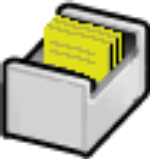
|
|
The latest stable release is 1.4.0-7 and can be downloaded from sourceforge.net.
For Fedora Core 7 and higher, install the package from Fedora Extras repository:
% sudo yum install granule
|
 Debian
|
Debian
|  Ubuntu
Ubuntu
The older version of Granule can be installed from respective repository:
% sudo apt-get install granule
|
It takes debian maintainers, however 6 to 8 weeks to propagate the newer releases throughout their system. For the latest release, you need to download and install packages by hand:
-
Install libgtkmm-2.4 and dependencies with apt-get:
% sudo apt-get install libgtkmm-2.4-1 Download and install latest libassa from its download page:
% sudo dpkg-install libassa_RELEASE_i386.debDownload and install latest Granule package from its download page:
% sudo dpkg-install granule_RELEASE_i386.deb
 Nokia Internet Tablet
Nokia Internet Tablet
Latest release can be installed with one-click install from its Maemo.org Download page.
 Windows NT/2000/XP
Windows NT/2000/XP
Granule comes pre-packaged as a ZIP archive with all run-time dependencies included:
- Granule-RELEASE-win32.zip (~12Mb).
Download and unzip the archive in the folder of your choice (c:/Program Files/).
Click on granule.exe Application in bin/ folder to start the application. You might want to create a desktop shortcut and use bin/granule.ico for an application icon.
 From Source
From Source
NOTE: To build from the source tarballs, you will need development packages (library_name-devel) of each library from the dependency list installed on your system.
You have to install Granule first before you can run it. An attempt to run it from source directory will not properly resolve paths to the icon files:
% tar xvfz granule-RELEASE.tar.gz
% cd granule-RELEASE
% configure && make
% su
# make install
... installation ...
#
# exit
% granule
|
| Copyright © 2004-2009 Vladislav Grinchenko |